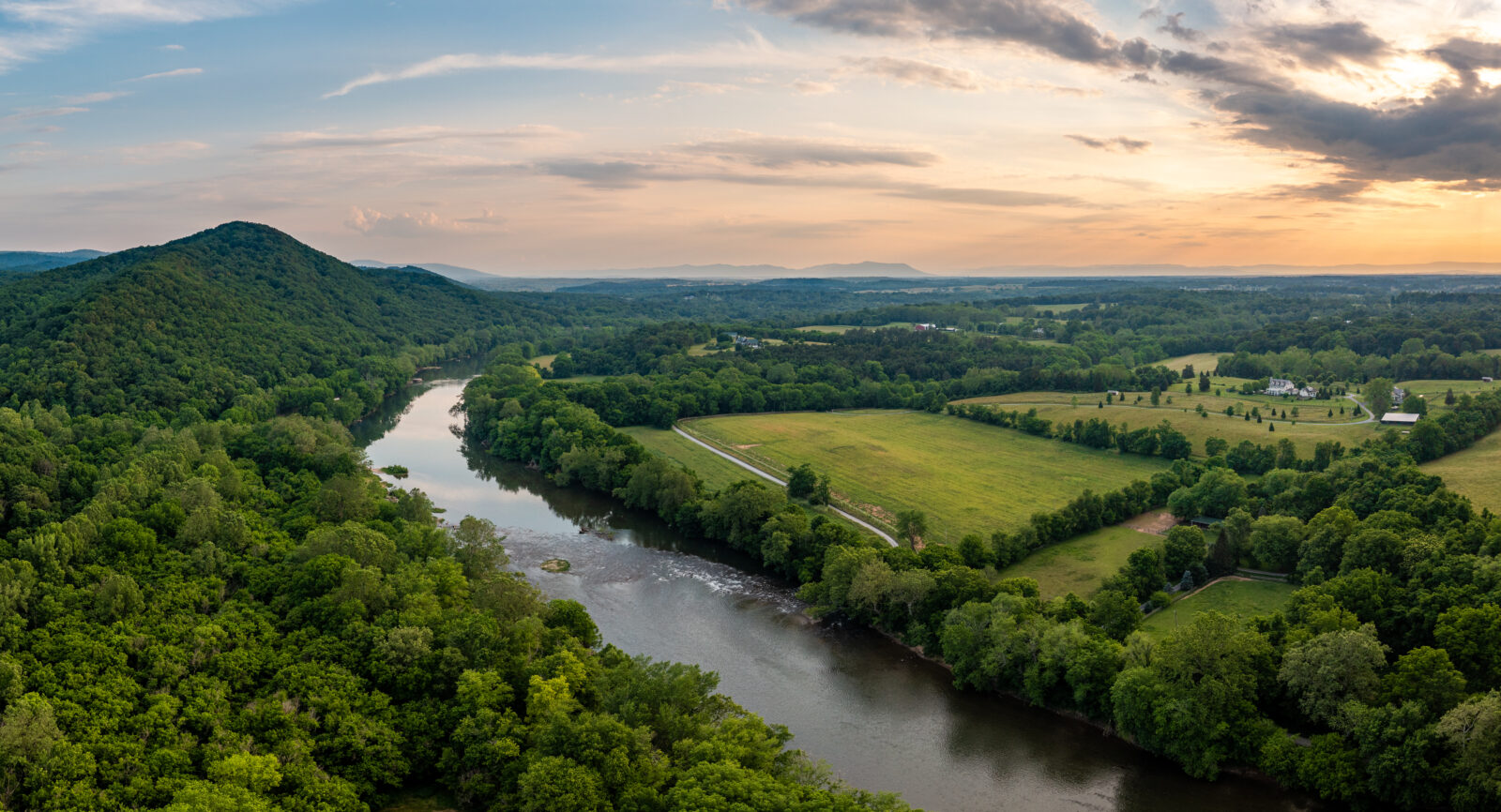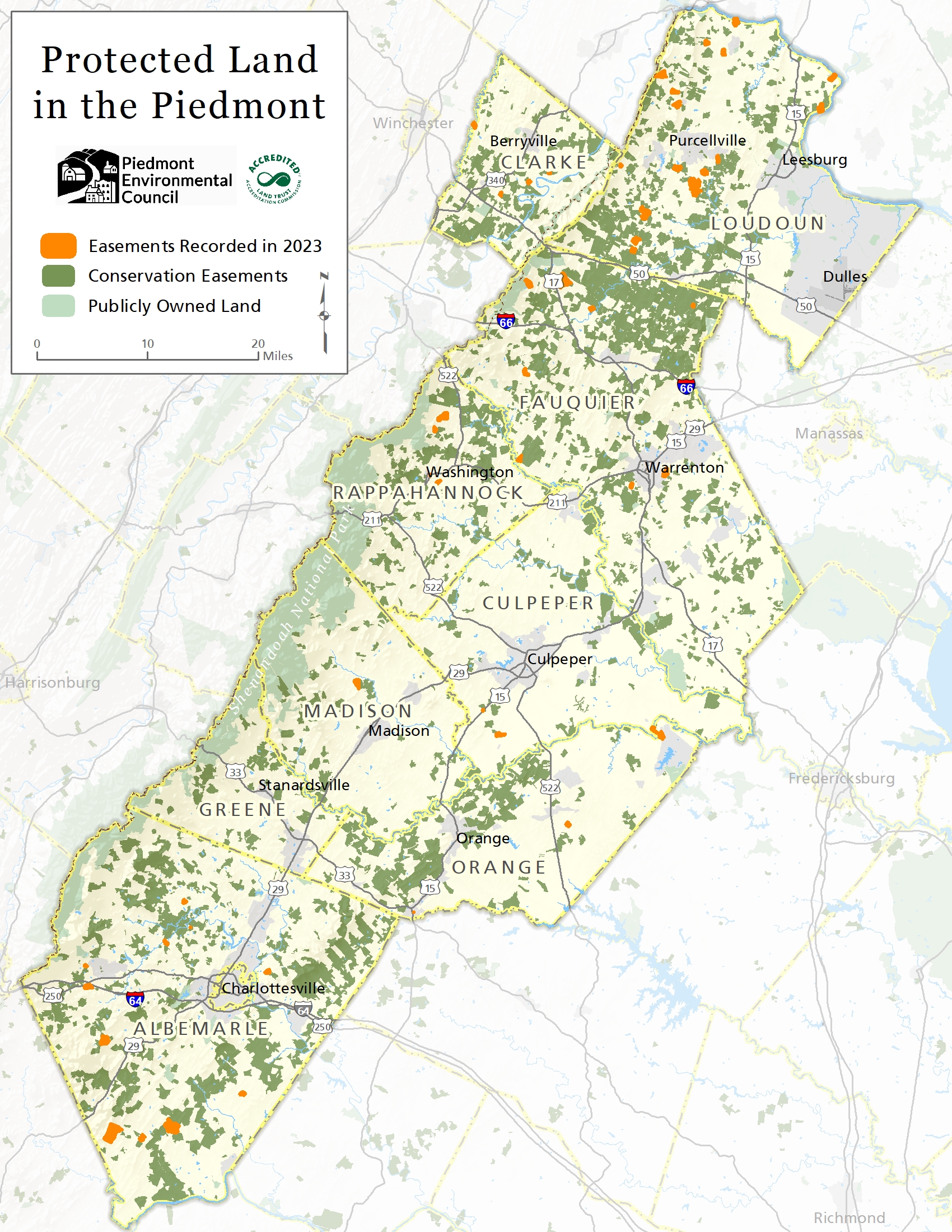6,315 Acres Conserved in Nine-County Region Last Year

PIEDMONT, VA — The Piedmont Environmental Council (PEC) reports that in 2023, 6,315 acres of land in Albemarle, Clarke, Culpeper, Fauquier, Greene, Loudoun, Madison, Orange, and Rappahannock counties were permanently protected with 52 new conservation easements. The new easements bring the total acres conserved within this region to 446,096. While these nine counties represent PEC’s primary service area, the easements reflect the partnership of landowners in this region with not only PEC, but also the Virginia Outdoors Foundation, Albemarle Conservation Easement Authority, Clarke County Conservation Easement Authority, Land Trust of Virginia, and other land trusts and conservation agencies.
| County | Number of Easements Closed | Acres Protected in 2023 by Conservation Easements* | Total Acres Protected by Conservation Easements* |
|---|---|---|---|
| Albemarle | 11 | 2,065 | 113,370 |
| Clarke | 4 | 154 | 27,756 |
| Culpeper | 3 | 106 | 21,536 |
| Fauquier | 9 | 1,065 | 111,626 |
| Greene | 0 | 0 | 10,787 |
| Loudoun | 16 | 2,286 | 70,152 |
| Madison | 1 | 126 | 16,491 |
| Orange | 3 | 223 | 40,426 |
| Rappa- hannock |
5 | 289 | 33,951 |
| PEC Region | 52 | 6,315 | 446,096 |
“This is a positive step toward the ambitious goal set in our 2023-2028 Strategic Plan of seeing and supporting another 100,000 acres of conserved lands by 2030, a critical threshold for sustainability, biodiversity, and climate resilience,” said Mike Kane, PEC land conservation director. “Longer term, we’d like to see 1 million acres conserved, a milestone we believe is achievable through continued strong partnership with landowners and preservation allies using a combination of public and private conservation tools.”
PEC President Chris Miller continues, “PEC’s 50-year practice of community-based conservation knits together the actions of individual landowners to create a much broader, composite picture of conservation across the region. Every conservation easement is crafted to demonstrate the public benefit of protecting land and resources, in keeping with the diverse perspectives and motivations of the landowner making the easement donation. And, by caring about the people and places of this region, we’re able to build a collective mosaic of conserved lands that results in cleaner waters, greater biodiversity, and increased public access to nature.”
The protection of two parcels at the southern- and northernmost ends of the region illustrates the effectiveness of conservation organization partners working together with landowners.

River Run Farm (formerly Nydrie Farm) within the Southern Albemarle Rural Historic District holds a nationally registered historic site, prime agricultural soils, “high-value agricultural and forestal lands” identified as statewide conservation priorities, and roughly 15,000 feet of perennial and intermittent streams, including the headwaters of Totier Creek, which serves as the public water supply for the Town of Scottsville. With an interest in protecting these important features, PEC initiated a conservation conversation with the new landowners and introduced them to the Albemarle County Easement Authority (ACEA). The ACEA plays a critical land conservation role in the county, holding easements that protect important land and resources on both small properties as well as large ones. ACEA-held easements in 2023 ranged from 46 acres to the 586-acre River Run Farm, whose conservation now connects large swaths of conserved lands to its north and south.
In Clarke County, the 60-acre Newfound Farm, owned by Dennis and Lissette Pippy, was an important conservation target for its 2,640 linear feet of frontage along the Opequon Creek, which serves as a public drinking water source, and for its forested areas of “very high conservation value” as classified by the Virginia Department of Forestry. The Clarke County Easement Authority was able to secure the easement with a combined $150,000 from the Virginia Office of Farmland Preservation and the Virginia Land Conservation Fund, while a $7,350 gift from PEC’s Clarke County Conservation Fund filled a funding gap left by a higher-than-expected appraisal.
And, in the middle of the region, two small conservation easements held by PEC reflect the value of urban conservation in improving access to outdoor recreation and nature in the built environment. As part of a community-wide effort to improve the town of Gordonsville’s historic Verling Park in Orange County, PEC purchased and conserved two lots, about an acre each, with the help of a Preservation Trust Fund grant from the Virginia Outdoors Foundation. The lots were then donated to Gordonsville, as they will allow the town to expand the 70-year-old park’s footprint, connecting it to Firemen’s Fairgrounds and surrounding neighborhoods; move and improve tennis courts; and add and update many park features, including a regulation-sized swimming pool that will replace what was, in its heyday, one of the only integrated public pools between Charlottesville and Fredericksburg, enabling children from five rural counties to learn to swim.
Virginia’s Piedmont is a unique place for residents and visitors alike, with its exceptional natural resources, productive farms and forests, and a landscape steeped in history. The abundant public benefits of these irreplaceable resources are multifaceted — individual, regional, global, economic, ecological, recreational, climatic.

A conservation easement is a voluntary agreement between a landowner and a public agency or a nonprofit conservation group, such as the Piedmont Environmental Council. As part of a suite of public policies ranging from local comprehensive plans to the multistate Chesapeake Bay Agreement, conservation easements provide important benefits to the public. For more information about conservation easements, visit pecva.org/easements.
Photos by Hugh Kenny.
Posted on: March 11, 2024








